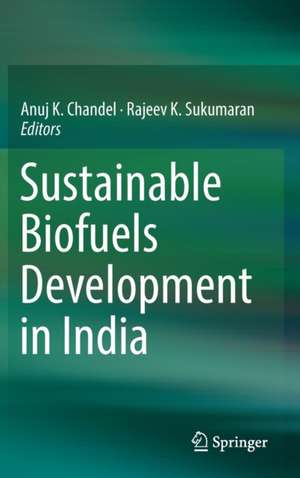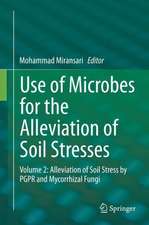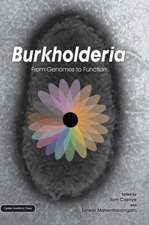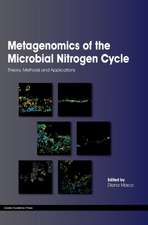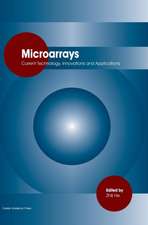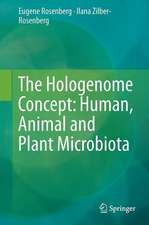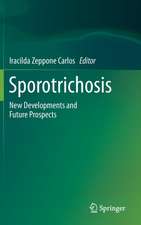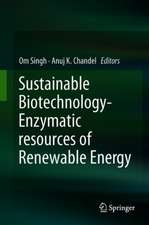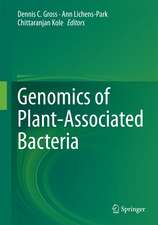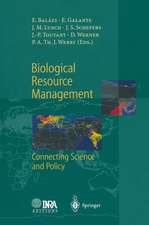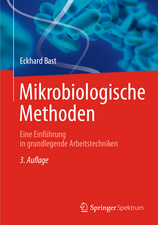Sustainable Biofuels Development in India
Editat de Anuj K. Chandel, Rajeev K. Sukumaranen Limba Engleză Hardback – 21 mar 2017
- As a first uniquely focused scientific and technical literature on bioenergy production in the context of India.
- To its coverage of technological updates on biomass collection, storage and use, biomass processing, microbial fermentation, catalysis, regeneration, solar energy and monitoring of renewable energy and recovery process.
- To the technical, policy analysis, climate change, geo-political analysis of bioenergy and green transportation fuels at industrial scale.
| Toate formatele și edițiile | Preț | Express |
|---|---|---|
| Paperback (1) | 1229.91 lei 6-8 săpt. | |
| Springer International Publishing – 21 iul 2018 | 1229.91 lei 6-8 săpt. | |
| Hardback (1) | 1236.19 lei 6-8 săpt. | |
| Springer International Publishing – 21 mar 2017 | 1236.19 lei 6-8 săpt. |
Preț: 1236.19 lei
Preț vechi: 1507.55 lei
-18% Nou
Puncte Express: 1854
Preț estimativ în valută:
236.55€ • 247.48$ • 196.50£
236.55€ • 247.48$ • 196.50£
Carte tipărită la comandă
Livrare economică 02-16 aprilie
Preluare comenzi: 021 569.72.76
Specificații
ISBN-13: 9783319502175
ISBN-10: 3319502174
Pagini: 672
Ilustrații: XVIII, 557 p. 145 illus., 119 illus. in color.
Dimensiuni: 155 x 235 x 32 mm
Greutate: 0.98 kg
Ediția:1st ed. 2017
Editura: Springer International Publishing
Colecția Springer
Locul publicării:Cham, Switzerland
ISBN-10: 3319502174
Pagini: 672
Ilustrații: XVIII, 557 p. 145 illus., 119 illus. in color.
Dimensiuni: 155 x 235 x 32 mm
Greutate: 0.98 kg
Ediția:1st ed. 2017
Editura: Springer International Publishing
Colecția Springer
Locul publicării:Cham, Switzerland
Cuprins
Section I: Overview and Background Research Analysis on raw materials, processing, synthesis, recovery and application as energy sources, production and consumption of crude oil, comparative account on major alternative energy producing countries Vs. India (3 Chapters).- Chapter 1: Production and consumption of petroleum and natural gas in India, oil import, new oil resources and price escalation pattern.- Chapter 2: Advancement in development of biodiesel production in last two decades: an overview on raw materials, synthesis and application.- Chapter 3: Review and critical analysis of bioethanol production scenario in India.- Chapter 4: Non-conventional renewable sources in India and their applications (Biohydrogen, Isobutanol, Solar, Wind, Turbines etc).- Chapter 5: Biomass power by thermochemical conversion of agricultural residues, plants and industrial wastes.- Section II (4 Chapters): (Feedstock variation: Agro-residues, wood, weed, forestry waste, algae, kitchen waste, Jatropha, Pongamia, domestic waste oils, etc, perspective on metabolic engineering to improve yeasts, plants and enzymes) + (Feedstock availability, Feedstock analysis, Feedstock composition, New feedstock, Practical biomass conversion into fuels and soil fertility).- Chapter 6: First and second generation ethanol: A comprehensive overview on feedstock availability, feedstock analysis, feedstock composition and potential conversion yields.- Chapter 7: Overview on the feedstock availability, composition, new potential resources for biodiesel production.- Chapter 8: Feedstock for biohydrogen and Biobutanol production via biotechnological routes.- Chapter 9: Algal feedstock: Promising biorefinery and other sustainable nutraceuticals feedstock for future.- Section III (5 Chapters): Technical aspects (Biomass processing, Biomass pretreatment, Hydrolysis, Fermentation, combined hydrolysis and fermentation, distillation), biodiesel processing (Oil extraction, processing, catalysis, trans-esterification, recovery) and Biohydrogen (Preparation of carbon recipe, fermentation, downstream processing), Catalytic conversion of biomass i.e. thermochemical conversion (gasification, pyrolysis, liquefaction).- Chapter 10: Technological updates for first and second-generation ethanol production.- Chapter 11:Intensive technological analysis for biodiesel production from variety of feedstock: state-of-the-art.- Chapter 12:Biotechnological platform for bio-hydrogen production: present status and future challenges.- Chapter 13: Exploration of lignocellulosic biomass into fuels via catalytic conversion routesand short chain alcohols.- Chapter 14: Technological development for the capturing, regeneration and storage of solar energy, geothermal energy, tidal energy, battery powered vehicles and turbines: assessment, testing and standardization, performance reliability and monitoring.- Section IV (3 Chapters):Techno-economic analysis, Technical Maturity, Economic and Environmental analysis, Sustainable impacts, Life cycle analysis, Food vs. Feed analysis, Government policy, Regulations, Private investment, Commercialization, large scale operations, effect of homemade renewable energy on inclusive growth, employment opportunities and socioeconomic impact of Indian farmer).- Chapter 15:Techno-economic and life cycle analysis of bioethanol production, Sustainable impact with fuel vs. feed concerns: Indian perspective.- Chapter 16: Techno-economic and life cycle analysis of biodiesel production withsustainable impact in next decade: Indian perspective.- Chapter 17: Biofuels policy implementation: Socio-economic indicators, rural development and benefits to Indian farmer.- Chapter 18:An assessment on Indian Government initiatives and policies for the promotion of biofuels implementation and private investments, Climate changes, Carbon accumulation and harmful effects on ecosystem.
Notă biografică
Dr. Anuj K. Chandel is working as a lead scientist for cellulosic ethanol production at Centro de Tecnologia Canavieira (Sugarcane Technology Centre, CTC), Piracicaba, Brazil. He is responsible for scientific leadership for deployment of cellulosic ethanol process at demonstration plant and scale up activities. Overall, he has 16 years’ research experience working in industries and universities on biomass conversion into ethanol, industrial enzymes production and membrane based separations. He has published 52 articles in peer-reviewed journals and 16 book chapters. He has also co-edited 4 books on D-xylitol, lignocellulose degradation, extremophiles and Brazilian bioenergy development. His primary research interest is to develop the sustainable process for bioconversion of lignocellulosics into renewable energy and biochemicals.Proactive research lead with entrepreneur mindset, that brings hands on strategic experience in research projects and startup of piloting to full commercial scale operations.
Dr. Rajeev Sukumaran is heading the Biofuels and Biorefineries Section at the CSIR-National Institute for Interdisciplinary Science and Technology’s Microbial Processes and Technology Division., in Trivandrum, India. He is also the activity lead for the Centre for Biofuels (CBF) at CSIR-NIIST. He has 20 years of research experience spanning diverse fields including fermentation technology, embryonic stem cell biology and transcriptomics, though currently he is working mainly on biomass conversion technologies. He played the leading role in setting up the CBF’s lignocellulosic ethanol pilot plant, and the solid state enzyme production pilot plant at CSIR-NIIST. His current research interests include-Developing enzymes for biomass conversion, Glucose tolerant β-glucosidases, heterologous protein expression in fungi, and fungal genomics. He has served as consultant for some leading Biotech companies in India. He has also publishedwidely with 73 publications in International Journals and has several conference papers, book chapters and reports.
Dr. Rajeev Sukumaran is heading the Biofuels and Biorefineries Section at the CSIR-National Institute for Interdisciplinary Science and Technology’s Microbial Processes and Technology Division., in Trivandrum, India. He is also the activity lead for the Centre for Biofuels (CBF) at CSIR-NIIST. He has 20 years of research experience spanning diverse fields including fermentation technology, embryonic stem cell biology and transcriptomics, though currently he is working mainly on biomass conversion technologies. He played the leading role in setting up the CBF’s lignocellulosic ethanol pilot plant, and the solid state enzyme production pilot plant at CSIR-NIIST. His current research interests include-Developing enzymes for biomass conversion, Glucose tolerant β-glucosidases, heterologous protein expression in fungi, and fungal genomics. He has served as consultant for some leading Biotech companies in India. He has also publishedwidely with 73 publications in International Journals and has several conference papers, book chapters and reports.
Textul de pe ultima copertă
This book will provide assistance to the broad range of readers involved in the crude oil import and production; renewable energy production; biomass analysis and bioconversion; greenhouse gas emissions; techno-economic analysis and government policies for implementing biofuels in India. This book presents important aspects on the large scale production of biofuels following a bio-refinery concept and its commercialization and sustainability issues. Hence, it is a useful resource to policy makers, policy analysts, techno-economic analysts and business managers who deal with commercialization and implementation of bio-based energy and other value-added products. The following features of this book attribute its distinctiveness:
- As a first uniquely focused scientific and technical literature on bioenergy production in the context of India.
- To its coverage of technological updates on biomass collection, storage and use, biomass processing, microbial fermentation, catalysis, regeneration, solar energy and monitoring of renewable energy and recovery process.
- To the technical, policy analysis, climate change, geo-political analysis of bioenergy and green transportation fuels at industrial scale.
Caracteristici
Covers all important aspects of renewable energy development in India Fast and reliable source on techno-economic analysis, climate change, geopolitical analysis of bioenergy and green transportation fuels at industrial scale Unique scientific and technical literature with clear images and tables Illustrates technological updates on biomass processing, system biology, microbial fermentation, catalysis, regeneration and monitoring of renewable energy systems and recovery process
